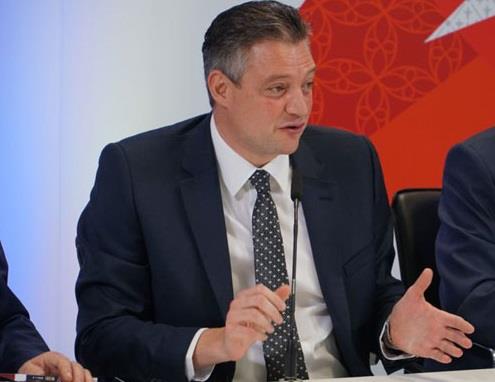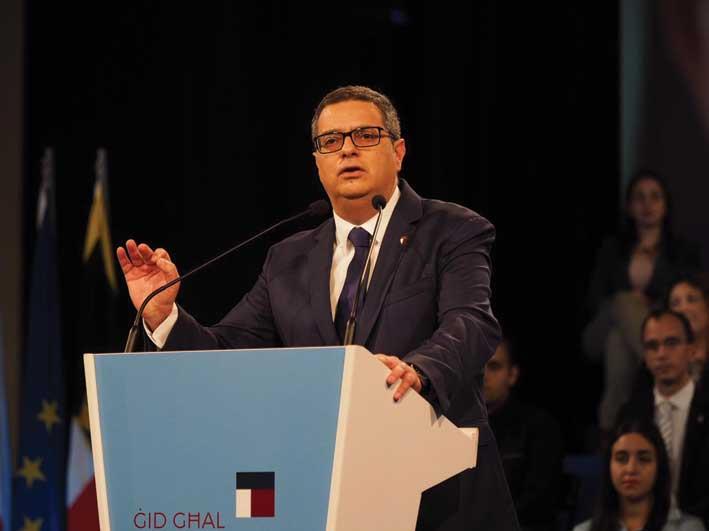There was a time not that long ago when Godfrey Farrugia sat on the government bench in Parliament. As Labour’s whip, his job was to keep the members of his side of the House in line – a job which was not easy back in May 2016, when Konrad Mizzi faced the first vote of no confidence tabled against him. On that day, Farrugia had backed the embattled Mizzi – but not before sharing a heartfelt and emotional speech calling on politicians of both sides to set the right example.
“I am a doctor,” Farrugia begins, “so when I have a patient in front of me, I listen. I give him/her the benefit of the doubt, I investigate, I arrive at a diagnosis, and then I prescribe medicine or give advice.
“I met Konrad Mizzi three times in 2016, and I gave him the benefit of the doubt,” he says.
He adds that what Mizzi did as a public figure – open a shell-company in Panama – should “never have been done”. But at that time, it was clear how much he and his family had been affected by the situation, so much so that Mizzi had told him, “I would not like to relive this moment ever again.” Fast-forward two years, Farrugia is now the leader of Partit Demokratiku which has recently filed a motion of no confidence in Konrad Mizzi. What has changed since when Marlene Farrugia’s first no confidence motion in 2016, and the PD’s motion filed recently?

Since then, Farrugia explains, Mizzi (above) has been the subject of many more exposés that make him all the more culpable than ever before. It should be noted that back then, Mizzi had said the company was opened for his family and nothing else. However, since then, revelations related to SOCAR’s supply of gas to the power station, the murder of Daphne Caruana Galizia, and, most of all, the disclosures on 17 Black and its connections to Mizzi, Keith Schembri and a shareholder in the Electrogas consortium, Jorgen Fenech, have all muddied the waters further.
Given these developments, does Godfrey Farrugia regret backing Konrad Mizzi in 2016? “Yes, definitely,” he says, before repeating the same phrase for emphasis. “That experience taught me something. It taught me how much dirt there is in politics, and how much we need to clean it up.”
Only days after Partit Demokratiku filed a motion of no confidence against Konrad Mizzi, the National Audit Office published a report examining the awarding of the contract for the gas-fired Delimara power station. This report was further proof that Mizzi is “incompetent” in his role, Farrugia says. He lists elements from the NAO’s report to back up this statement, noting the involvement of Nexia BT’s Brian Tonna in key parts of the process, shortcomings in due diligence, wording of the contract, the irregular nature of the transfer of Gasol’s 30% shares in Electrogas, and the NAO’s conclusion that electricity from the interconnector is far cheaper than if it were coming from the power station. All these reasons, Farrugia continues, show that there was no transparency or accountability on Mizzi’s part in handling this massive project.
Since the publication of the NAO’s report, the government has called the shortcomings that the report points out as “technical” discrepancies, saying that the most important thing was that irrespective of the discrepancies, the final outcome would not have changed. Farrugia calls this argument a part of “the broken system”, that this is a question of taking political responsibility to carry out things in a correct way.

Farrugia clarifies: “I believe that we should not rely on just the interconnector, as it depends on other jurisdictions,” referring to recent threats by Matteo Salvini to cut Malta’s electricity supply in the midst of a migration crisis. “Having your own power station is positive; but not with an 18-year supply contract which is detrimental to the country. This is where accountability and good governance comes in,” Farrugia says.
The government has also taken exception to the NAO’s calculations that the interconnector is cheaper than the power station, with Prime Minister Joseph Muscat calling the matter a “misinterpretation” by the NAO. Farrugia however does not agree with Muscat’s argument: “Remember that the interconnector used EU funds so government costs are a fraction of the total capital expenditure.” If one carries out the proper calculations, Farrugia continues, the interconnector is in the end much more worth the expense than the power station anyway.
Despite the climate of suspicion and the pressure that Mizzi is currently under, the Nationalist Party, last Wednesday, moved a motion calling for a public inquiry into Daphne Caruana Galizia’s murder and for the resignation of the Attorney General and Police Commissioner, hence side-lining the PD’s motion until at least after the New Year.
“We had no communication whatsoever from the PN. I got to know about Adrian Delia’s motion from the newspapers,” Farrugia laments. “I think that Delia was too proud to accept the PD’s motion to be debated now simply because it is the PD filing it,” he continues before noting that no time was better than the present to debate the no confidence motion. Parliament has to condemn such things, Farrugia said. Would not government members simply back Konrad though? “I don’t know!” Farrugia says. “There are MPs on the government side that have been taken aback by what is being brought to light, and are much more confused now than in 2016, and Delia certainly knows this,” he continues. The timing to move such a motion of no confidence now is perfect, Farrugia says, but instead the PN chose to move a motion that was “half-baked”.

He calls Delia’s motion such because the PN has proposed that a board of inquiry, which the PD supports in principle, is set up by the Prime Minister. “I say this categorically – I have no faith in the Prime Minister.” How can Delia truly believe that this board will be independent when it is the Prime Minister who will appoint it, Farrugia questions? Will the board have the necessary tools; will it provide a long-term change, Farrugia continues.
“We want truth, justice and long term change from such a board, and I am ready to meet [Delia] face to face on this matter,” Farrugia adds. The PD leader says that he wants a long-term change particularly in favour of the free speech of journalists – Daphne Caruana Galizia’s murder “chilled” journalists to the core, and their right to speak the truth in no uncertain terms must be protected.
In fact, the PD has published a statement saying that they support the conclusions of Caoilfhionn Gallagher QC and Tony Murphy, and the legal opinions issued on behalf of the Caruana Galizia family in August 2018 and November 2018. It invited all Members of Parliament of goodwill to work together to deliver a truly independent public inquiry into the circumstances surrounding the assassination of Daphne Caruana Galizia that satisfies the “progressive” standards set out in the legal opinion.
Is there some form of collusion between the Labour Party and the Nationalist Party? Farrugia thinks so. Political decisions have to include certain action, have to be well timed, and have to be congruent. There were three occasions when this did not happen and the collusion between the PN and the PL was clear, Farrugia says.

On taking action – or rather, the lack of action – Farrugia mentions Delia’s lack of action after learning of what can almost be called a direct order worth a quarter of a billion euros at St Vincent De Paul Residence. In terms of untimely action, Farrugia cites the case of db Group’s mega-development on the former ITS site, where after two years of the PD fighting against the case, Delia spoke against the project two days before the vote was to take place “when he already knew that the vote was going to pass”. On incongruence, Farrugia cites the Egrant case, saying that Delia’s decision to instantly try and sack Simon Busuttil “doesn’t make sense”.
Politics should never be about pride, ego, or personal agenda, Farrugia says. “It is there so that we can serve the common good, the interests of our country and to attain prosperity through sustainability. The political party is the tool to reach those goals,” he adds.
This is Godfrey Farrugia’s vision for how a political party should work; in fact, Partit Demokratiku will be contesting the upcoming MEP elections next May. So far, Anthony Buttigieg and Martin Cauchi Inglott have been announced as candidates representing the party; Farrugia says that there will be two more announced in the future.
More than out of will, this is being done due to what Farrugia describes as a “farcical” part of the electoral law – that for a party to have its name and logo on the ballot sheet, it has to field at least four candidates. He veers off on a slight tangent, saying that the country’s electoral law is further evidence of collusion between the two major parties, with reference to the system that is used to modify the composition of seat in the House so that it reflects the total percentage of votes. This system only takes into account political parties that elect a candidate; the votes of those people whose party does not elect a candidate are “discarded and forgotten”, Farrugia says, even though there have been times in the past where a third party has garnered enough total votes to have a seat in Parliament. “It’s like the PL and PN have some sort of agreement not to change the system and they prefer the bi-partisan approach – the ‘give me and I’ll give you’ supermarket,” Farrugia laments.
At a local level meanwhile, the PD is yet to decide whether they will be fielding candidates for the upcoming local council elections. The PD’s hopes however hinge on there being a swing in voters towards them – be it from the PL or the PN. Does Farrugia think that this will happen?
“People want a new voice,” he says with a sense of confidence; “they want a new way of political approach.” He believes that Europe too needs to see an element of renewal and reform; there are things, such as the digital market, which still need to be checked out. Other matters, such as social justice, long-term sustainability, the green economy, and especially those thousands at risk of poverty, must be addressed, Farrugia says.
However more than anything else, he believes in the potentials of the people themselves. With PD, it is not a question of “politics of perception” like one sees with the PL and PN; it is one of “conviction” and one which represents the “force of reason”. “If we want to fix the broken system, we have to have the politics to address the broken system not only with our words, but by our actions as well,” Farrugia concludes.